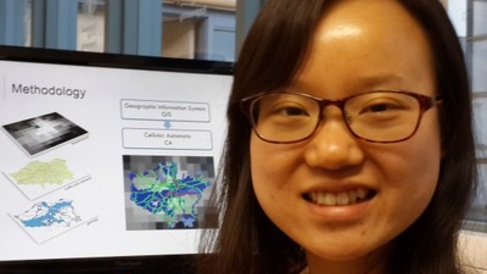Bingyu Zhao, PhD student at CSIC

Name: Bingyu Zhao, (Former) PhD student at CSIC
• What attracted you to engineering?
I became interested in engineering when I was little after seeing my dad, a chemical engineer, working in a lab in my hometown Fushun in China. I just thought it was the coolest work place. After high school, I chose civil engineering as my major but the choice was not welcomed by my family who, at that time, thought civil engineering was hard and male-dominated. I was not sure if I should give up on the idea myself but then attended a structural engineering competition between senior students and what I saw there was totally different to this idea. Teams devoted themselves to making original designs and building beautiful models – several of which I still remember clearly because they were ingenious. It was at that event that I knew I was in the right place.
• What is the subject of your work?
I am now a third year PhD student. My project is about the asset management of urban transport infrastructures, which is summarised (humorously) as a PhD on potholes. I work with real-world infrastructure data and try to understand where and when defects occur, as well as how best to prevent them.
• What motivates you?
I feel a sense of purpose in my work because it is original. While, as a piece of research, it builds on the works of others, I learn and adapt this knowledge to my specific subject. I enjoy the learning experience involved with research too.
• What/who has helped shape your career?
I am still at a very early stage of my career. Many of my undergraduate professors were young alumni and alumnae of our university. They were passionate about their research and teaching, which influenced and inspired me to pursue a PhD.
• What have you gained from working with CSIC?
When I started my PhD I was assigned a desk at the CSIC office and was soon ‘adopted’ by CSIC colleagues into their academic and non-academic activities. Working with CSIC exposes me to a wide range of research topics and I have the opportunity to see how they are transformed into real applications. Most importantly, my CSIC colleagues are great friends and that makes working together a lot more interesting.
• Have you overcome challenges and setbacks in your working life?
As a student, my ‘working life’ is relatively carefree. The most difficult time in my PhD so far was probably the first year – the change from mainly taking classes as an undergraduate to pursuing research. I remember feeling overwhelmed by the ocean of papers but it is a necessary transition that all research students have to make.
• What do you like best about what you do?
My PhD project is very interdisciplinary and requires knowledge from engineering, urban planning, statistics and computing skills. I am learning a lot across a range of subjects with the help of many different people and I value this experience the most in my PhD.
• Where would you like to see your career going?
I would love to stay in academia or do research-related work. However, if things do not go as planned, I will follow the opportunities that come along.
• Do you have any role models?
I find people who have not always enjoyed a smooth path in their careers, but have kept on going in order to succeed, particularly inspiring. I love the idea of a ‘CV of Failures’, as proposed by academics including Melanie Stefan and Johannes Haushofer. My supervisors and many others I work with are also open about failures and challenges – their positivity in adversity sets the best example for me.
• What do you think might encourage more women to work in science and engineering?
A recent article in The Economistcites findings (from a report by academic publisher Elsevier) acknowledging that, while science remains male dominated, females are catching up. I would encourage girls and women who love STEM to go for it because it is big enough for everyone, whatever gender or background, to find something meaningful.
• Do you have any advice for women who may be considering pursuing a career in this area?
At the beginning of my PhD, I spent too much time worrying about not making progress, which was not necessary. I am learning to feel at ease with my progress and, in this way, to be happier and more efficient.
